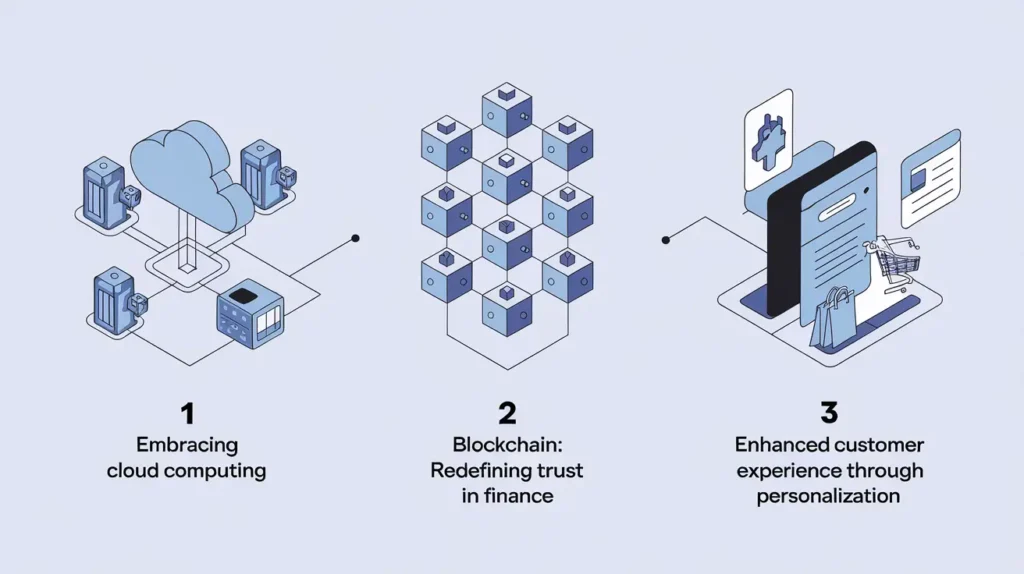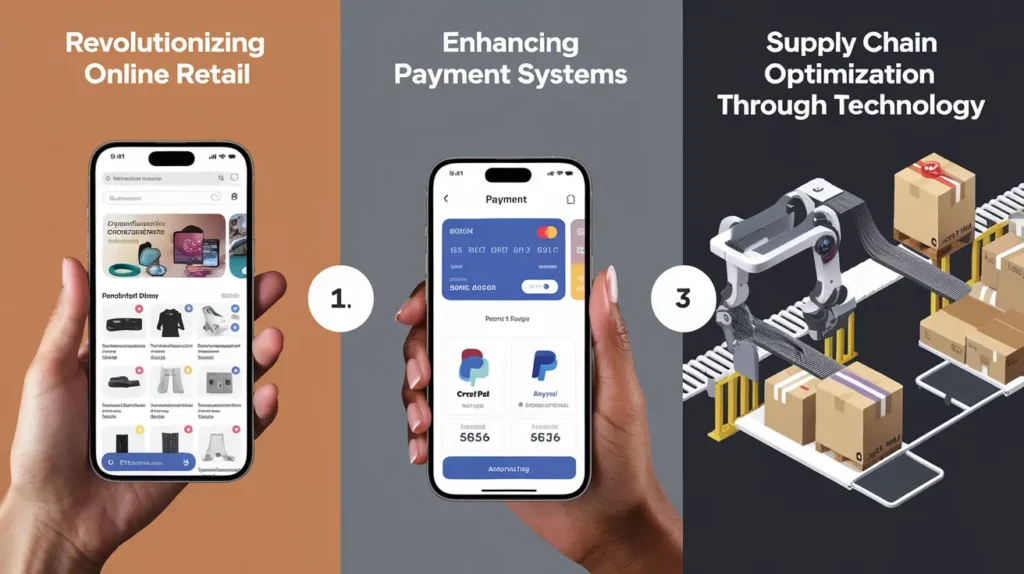The Role of Technology in Business and Finance: Exploring 6 Transformative Approaches

Table of Contents
- 1. The Digital Transformation Journey
- Also Read About Home Decor
- 2. The Role of Data Analytics in Decision Making
- 3. The Evolution of E-Commerce Technologies
- 4. The Impact of Social Media on Business Strategy
- 5. Role of Technology in Business and Finance :Preparing for Regulatory Changes
- 6. Looking Ahead: The Future of Technology in Business and Finance
- Conclusion: Role of Technology in Business and Finance
- FAQs: The Role of Technology in Business and Finance
- 1. How is technology transforming the finance and business sectors?
- 2. What are some examples of automation in business and finance?
- 3. How does data analytics benefit financial decision-making?
- 4. What is the role of artificial intelligence (AI) in finance?
- 5. How is blockchain technology impacting finance?
- 6. What are the benefits of using cloud computing in business?
- 7. How is cybersecurity becoming more critical in business and finance?
- 8. What are the advantages of fintech solutions for businesses?
- 9. How does digital transformation affect customer experience in finance?
- 10. What are some risks associated with technology in finance and business?
1. The Digital Transformation Journey
The concept of digital transformation involves integrating digital technologies into all aspects of a business, fundamentally altering how it operates and delivers value to customers. This transformation is not merely about technology adoption; it represents a cultural shift that requires organizations to continuously challenge the status quo, experiment, and become more agile in their operations.
- Embracing Cloud Computing
Cloud computing has emerged as a pivotal force in modern business and finance, providing scalable resources and enhanced collaboration. By leveraging cloud solutions, organizations can achieve significant cost savings, improve accessibility, and foster collaboration among teams dispersed across geographical boundaries. This shift enables real-time data sharing and facilitates decision-making processes, which are crucial for maintaining a competitive edge.
- 1. The Rise of Artificial Intelligence and Machine Learning
Artificial Intelligence (AI) and Machine Learning (ML) are revolutionizing how businesses analyze data and engage with customers. By harnessing the power of AI, organizations can gain insights into consumer behavior, automate routine tasks, and enhance customer experiences. In finance, AI-driven algorithms are used for predictive analytics, risk assessment, and fraud detection, thereby improving operational efficiency and reducing potential losses.

- Blockchain: Redefining Trust in Finance
The advent of blockchain technology is reshaping the financial landscape by introducing a decentralized and transparent framework for transactions. By enabling secure and tamper-proof transactions, blockchain reduces the need for intermediaries, lowers transaction costs, and enhances the speed of financial operations. Financial institutions are increasingly adopting blockchain solutions to streamline processes such as cross-border payments, asset management, and smart contracts.
- 2. The Impact of Fintech on Financial Services
Financial Technology (Fintech) represents a significant shift in the delivery of financial services. Fintech companies leverage technology to provide innovative solutions that enhance the customer experience, improve efficiency, and lower costs. From mobile banking apps to peer-to-peer lending platforms, fintech is democratizing access to financial services and fostering financial inclusion.
- Enhanced Customer Experience Through Personalization
One of the key benefits of fintech is its ability to offer personalized experiences to consumers. By utilizing data analytics and AI, fintech companies can tailor their services to meet individual customer needs. This level of personalization not only enhances customer satisfaction but also fosters loyalty, as consumers are more likely to engage with brands that understand and cater to their unique preferences.

- 3. Robo-Advisors: A New Era in Wealth Management
Robo-advisors have gained popularity by providing automated, algorithm-driven financial planning services with minimal human intervention. These platforms analyze a client’s financial situation and investment goals to offer personalized investment strategies. By lowering the barriers to entry for investment management, robo-advisors make wealth management accessible to a broader audience, including those who may have previously been underserved by traditional financial institutions.
- 4. Cybersecurity: Safeguarding the Digital Frontier
As technology continues to advance, the importance of cybersecurity cannot be overstated. With the increasing digitization of business operations and financial transactions, organizations must prioritize the protection of sensitive data and financial assets. Cyber threats, such as data breaches and ransomware attacks, pose significant risks that can undermine consumer trust and lead to substantial financial losses.
- Investing in Robust Cybersecurity Measures
To mitigate these risks, businesses are investing in comprehensive cybersecurity strategies that encompass technology, processes, and personnel. This includes implementing advanced threat detection systems, conducting regular security audits, and fostering a culture of security awareness among employees. By proactively addressing cybersecurity challenges, organizations can safeguard their operations and maintain customer confidence.
- 5. The Future of Work: Remote and Hybrid Models
The COVID-19 pandemic accelerated the adoption of remote work, fundamentally changing how businesses operate. The shift to remote and hybrid work models has highlighted the importance of technology in facilitating collaboration and maintaining productivity in a dispersed workforce.
- Leveraging Collaboration Tools
To support remote work, organizations are increasingly turning to collaboration tools such as video conferencing platforms, project management software, and cloud-based document sharing services. These technologies enable teams to communicate effectively, share resources, and collaborate on projects in real-time, regardless of their physical location.
- Evolving Workplace Dynamics
As businesses continue to adapt to these new work models, the emphasis on employee well-being and work-life balance has gained prominence. Organizations are leveraging technology to create flexible work environments that promote productivity and employee satisfaction. This shift not only enhances employee engagement but also positions companies as attractive employers in a competitive job market.

- 6. Sustainable Business Practices Through Technology
The intersection of technology and sustainability is becoming increasingly vital as businesses recognize the importance of corporate social responsibility. Technology is enabling organizations to adopt sustainable practices that minimize environmental impact and promote social well-being.
- Harnessing Data for Sustainable Decision-Making
Through data analytics, businesses can gain insights into their operations’ environmental impact, identify areas for improvement, and implement strategies to reduce waste and carbon emissions. Additionally, technologies such as Internet of Things (IoT) sensors enable real-time monitoring of resource usage, allowing organizations to optimize their processes for greater sustainability.
- Promoting Ethical Supply Chains
Technology also plays a crucial role in promoting ethical supply chains. By utilizing blockchain and IoT, businesses can enhance transparency and traceability in their supply chains, ensuring that products are sourced ethically and sustainably. This commitment to ethical practices resonates with consumers and fosters brand loyalty.
Also Read About Home Decor
2. The Role of Data Analytics in Decision Making
- Harnessing Big Data for Strategic Insights
In the digital age, data analytics has become a cornerstone of effective business strategy. Organizations are inundated with vast amounts of data generated from customer interactions, market trends, and operational processes. By leveraging big data analytics, businesses can extract valuable insights that inform decision-making and drive strategic initiatives.
Data analytics tools enable companies to identify patterns, forecast future trends, and understand consumer behavior at a granular level. This capability empowers businesses to make data-driven decisions, optimize their operations, and enhance customer engagement. For instance, retail companies can analyze purchasing patterns to tailor their marketing strategies, while financial institutions can assess credit risk more accurately.

- Real-Time Analytics for Agile Decision Making
The need for agility in decision-making has never been more critical. Real-time analytics allows businesses to respond swiftly to changing market conditions and customer preferences. By monitoring key performance indicators (KPIs) and operational metrics in real-time, organizations can adapt their strategies dynamically, ensuring they remain competitive and relevant in a fast-paced environment.
3. The Evolution of E-Commerce Technologies
- Revolutionizing Online Retail
The rise of e-commerce has transformed the retail landscape, with technology at its core. Online shopping platforms are continually evolving to provide consumers with seamless shopping experiences. Features such as personalized product recommendations, user-friendly interfaces, and mobile optimization are essential in attracting and retaining customers in the digital marketplace.
- Enhancing Payment Systems
Digital payment systems have revolutionized transactions, making them faster and more secure. Technologies such as mobile wallets, contactless payments, and cryptocurrency transactions are gaining traction, reflecting consumer demand for convenience and security. Businesses that adopt these technologies can provide their customers with a variety of payment options, improving the overall shopping experience.

- Supply Chain Optimization through Technology
The integration of technology in supply chain management has also led to significant advancements. Businesses are utilizing IoT devices and machine learning algorithms to optimize inventory management, forecast demand, and streamline logistics. By enhancing visibility and control over their supply chains, organizations can reduce costs, minimize waste, and improve service delivery.
4. The Impact of Social Media on Business Strategy
- Leveraging Social Media Analytics
Social media platforms have become invaluable tools for businesses looking to engage with customers and build brand awareness. Social media analytics enables organizations to track engagement metrics, understand audience sentiment, and tailor their marketing strategies accordingly. By leveraging insights gained from social media interactions, companies can enhance their customer engagement and drive brand loyalty.

- The Role of Influencer Marketing
The rise of influencer marketing represents a new frontier in business strategy. Brands are increasingly partnering with influencers to reach target audiences authentically and effectively. By aligning their messaging with trusted voices in the community, businesses can enhance their credibility and expand their reach in a competitive marketplace.
5. Role of Technology in Business and Finance :Preparing for Regulatory Changes
- Navigating Regulatory Compliance in Finance
As technology continues to shape the business and financial landscapes, regulatory frameworks are also evolving. Businesses must stay abreast of regulatory changes to ensure compliance and avoid potential penalties. Technologies such as RegTech (regulatory technology) are emerging to help organizations navigate complex regulatory environments efficiently.
RegTech solutions utilize advanced analytics and machine learning to streamline compliance processes, automate reporting, and identify potential risks. By adopting these technologies, businesses can enhance their compliance efforts and minimize the administrative burden associated with regulatory adherence.

- Addressing Data Privacy Concerns
With the increased reliance on data comes heightened scrutiny regarding data privacy. Organizations must prioritize data protection and ensure compliance with regulations such as the General Data Protection Regulation (GDPR) and the California Consumer Privacy Act (CCPA). Implementing robust data governance frameworks and utilizing privacy-enhancing technologies can help businesses safeguard customer information and build trust with their stakeholders.
6. Looking Ahead: The Future of Technology in Business and Finance
As we peer into the future, the role of technology in business and finance is poised to expand even further. Emerging technologies such as quantum computing, augmented reality (AR), and 5G connectivity hold the potential to revolutionize various sectors, opening new avenues for innovation and growth.
- Embracing Continuous Learning and Adaptation
In this rapidly changing landscape, organizations must foster a culture of continuous learning and adaptation. Embracing new technologies and methodologies will be crucial for businesses seeking to thrive in an increasingly digital world. By investing in employee training and development, companies can equip their workforce with the skills needed to leverage emerging technologies effectively.
- Building Resilience through Innovation
Ultimately, the businesses that will succeed in the future are those that prioritize innovation and adaptability. By harnessing the power of technology and fostering a culture of resilience, organizations can navigate the complexities of the modern business environment and emerge stronger in the face of challenges.
Conclusion: Role of Technology in Business and Finance
As we navigate the future of business and finance, the role of technology in business and finance will continue to expand, driving innovation and reshaping traditional practices. By embracing digital transformation, leveraging emerging technologies, and prioritizing cybersecurity and sustainability, organizations can position themselves for success in an increasingly competitive landscape. The integration of technology not only enhances operational efficiency but also fosters deeper connections with customers, paving the way for sustainable growth and prosperity in the years to come.
FAQs: The Role of Technology in Business and Finance
1. How is technology transforming the finance and business sectors?
Technology is revolutionizing finance and business through automation, data analytics, AI, blockchain, and cloud computing. These advancements enhance decision-making, improve operational efficiency, boost customer engagement, and create more secure financial transactions. Businesses can better meet customer needs and maintain a competitive edge in a fast-evolving market.
2. What are some examples of automation in business and finance?
Automation in business and finance includes robotic process automation (RPA) for repetitive tasks, automated billing and invoicing systems, AI-powered chatbots for customer service, and automated trading platforms in finance. These technologies streamline processes, reduce errors, and allow human workers to focus on higher-value tasks.
3. How does data analytics benefit financial decision-making?
Data analytics enables financial institutions and businesses to analyze large volumes of data to identify trends, assess risks, and make informed decisions. By utilizing predictive analytics and machine learning, companies can forecast market behavior, improve risk management, and optimize investment strategies, leading to smarter financial choices.
4. What is the role of artificial intelligence (AI) in finance?
AI in finance is used for various applications such as fraud detection, credit scoring, personalized financial advice, and customer service automation. AI-powered algorithms analyze patterns in transaction data to identify fraudulent activity, improve underwriting accuracy, and offer personalized financial solutions, enhancing both security and customer experience.
5. How is blockchain technology impacting finance?
Blockchain provides a decentralized, secure, and transparent method of recording transactions. It supports innovations like cryptocurrency, smart contracts, and digital identities. By eliminating intermediaries and enhancing data integrity, blockchain technology reduces transaction costs, speeds up processing times, and bolsters trust in financial transactions.
6. What are the benefits of using cloud computing in business?
Cloud computing offers scalable resources, allowing businesses to access powerful computing, storage, and analytics capabilities without the need for costly infrastructure. Benefits include enhanced collaboration, improved data security, and real-time data access, enabling businesses to innovate and adapt quickly to changing market conditions.
7. How is cybersecurity becoming more critical in business and finance?
With increasing digital transactions and data sharing, cybersecurity is vital to protect sensitive information from cyber threats. Enhanced security protocols, such as multi-factor authentication and advanced encryption, help businesses and financial institutions safeguard customer data, maintain regulatory compliance, and build customer trust.
8. What are the advantages of fintech solutions for businesses?
Fintech solutions, such as mobile payment platforms, digital wallets, and lending apps, simplify financial transactions, improve accessibility, and offer personalized services. For businesses, these solutions enhance customer convenience, streamline payment processes, and enable access to financial services, particularly for underbanked populations.
9. How does digital transformation affect customer experience in finance?
Digital transformation offers faster, more personalized, and convenient services. Customers benefit from mobile banking, automated support through chatbots, personalized financial advice, and simplified loan applications. This improved accessibility and customization enhance customer satisfaction and loyalty in financial services.
10. What are some risks associated with technology in finance and business?
While technology brings numerous benefits, risks include cybersecurity threats, data privacy concerns, and potential job displacement due to automation. Regulatory challenges also arise with new tech like blockchain and AI. Businesses must balance innovation with security, ethical practices, and compliance to mitigate these risks.




